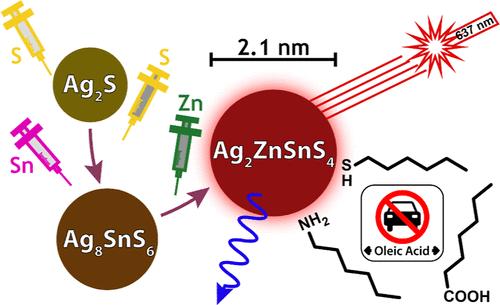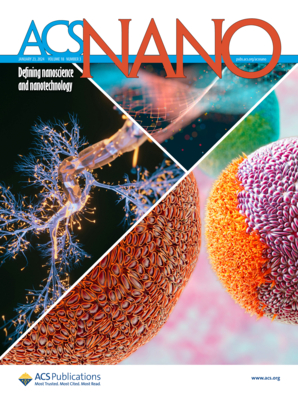逐步反应生成超小型 Ag2ZnSnS4 纳米晶体
IF 15.8
1区 材料科学
Q1 CHEMISTRY, MULTIDISCIPLINARY
引用次数: 0
摘要
Pirquitasite Ag2ZnSnS4 (AZTS)纳米晶体(NCs)是一种新兴的无铅发光材料,在光电技术中有着广泛的应用。像许多多纳米材料一样,它们的相纯合成由于杂质的产生而变得复杂,例如二元/三元硫族化合物和还原金属。在这里,我们开发了一种逐步合成的方法,控制了棘长石状(Ag2S)和canfield状(Ag8SnS6)中间体的大小、形态和转化。该反应方案允许生产较小的AZTS nc(直径:2.1-4.0 nm),这是我们通过既定的单次注射程序无法实现的──将量子限制AZTS发射的可访问范围扩展到更短的波长(λ: 650-740 nm)。我们发现初始硫化学计量学是模板尺寸可调性的关键,并揭示了时间分离的转化步骤对于获得具有发射λ <的相纯AZTS NCs至关重要;740海里。然后,我们使用核磁共振和光谱学来证明,巯基配体的安装提高了胶体稳定性,而暴露于羧酸则没有。最后,通过这种增强的合成控制,我们表明我们的超小AZTS NCs可以作为红到蓝三态融合上转换的有效,低毒性的增敏剂。我们的研究结果突出了复杂、毒性较低的四元纳米晶系统的合成和合成后处理的可转移见解。本文章由计算机程序翻译,如有差异,请以英文原文为准。

A Stepwise Reaction Achieves Ultrasmall Ag2ZnSnS4 Nanocrystals
Pirquitasite Ag2ZnSnS4 (AZTS) nanocrystals (NCs) are emergent, lead-free emissive materials in the coinage chalcogenide family with applications in optoelectronic technologies. Like many multinary nanomaterials, their phase-pure synthesis is complicated by the generation of impurities, e.g., binary/ternary chalcogenides and reducedmetals. Here, we develop a stepwise synthetic procedure that controls the size, morphology, and transformations of acanthite-like (Ag2S) and canfieldite-like (Ag8SnS6) intermediates. This reaction scheme grants the production of small AZTS NCs (diameter: 2.1–4.0 nm) that we cannot achieve through established single-injection procedures─expanding the accessible range of quantum-confined AZTS emission to shorter wavelengths (λ: 650–740 nm). We show that the initial sulfur stoichiometry is the key handle for template-size tunability and reveal that temporally separating transformation steps is crucial to obtaining phase-pure AZTS NCs with emission λ < 740 nm. We then use NMR and optical spectroscopies to demonstrate that the installation of thiol ligands improves colloidal stability, while exposure to carboxylic acids does not. Finally, facilitated by this enhanced synthetic control, we show that our ultrasmall AZTS NCs can act as effective, less-toxic sensitizers for red-to-blue triplet fusion upconversion. Our results highlight transferrable insights for the synthesis and postsynthetic treatment of complex, less-toxic quaternary nanocrystalline systems.
求助全文
通过发布文献求助,成功后即可免费获取论文全文。
去求助
来源期刊

ACS Nano
工程技术-材料科学:综合
CiteScore
26.00
自引率
4.10%
发文量
1627
审稿时长
1.7 months
期刊介绍:
ACS Nano, published monthly, serves as an international forum for comprehensive articles on nanoscience and nanotechnology research at the intersections of chemistry, biology, materials science, physics, and engineering. The journal fosters communication among scientists in these communities, facilitating collaboration, new research opportunities, and advancements through discoveries. ACS Nano covers synthesis, assembly, characterization, theory, and simulation of nanostructures, nanobiotechnology, nanofabrication, methods and tools for nanoscience and nanotechnology, and self- and directed-assembly. Alongside original research articles, it offers thorough reviews, perspectives on cutting-edge research, and discussions envisioning the future of nanoscience and nanotechnology.
 求助内容:
求助内容: 应助结果提醒方式:
应助结果提醒方式:


